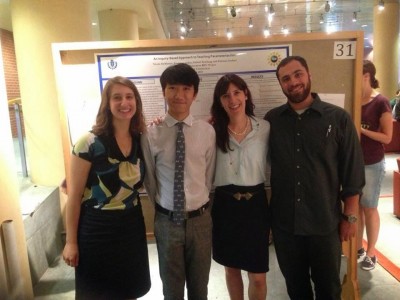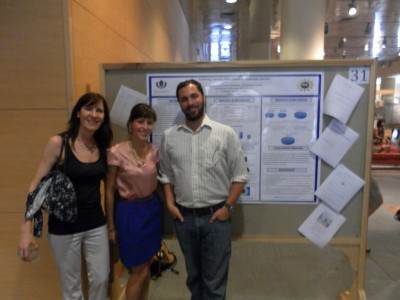Math Ed
Investigating the Interplay of Argumentation and Mathematics in Classroom Tasks
Group Members
Supervisors
Steven Lemay
Overview
This project was motivated by the current emphasis on argumentation in the Common Core State Standards for Mathematics. In particular, we focused on tasks that address the third standard for Mathematical Practice that highlights argumentation as an expertise all students should develop. Our data consists of 157 tasks from 40 elementary and high school teachers participating in a professional development program focused on mathematical argumentation. We analyzed how argumentation affects the cognitive demand levels of the tasks, as well as how argumentation detracts or contributes to the mathematical content in the tasks. Our findings show a change in cognitive demand levels when tasks were analyzed with and without the argumentation component. In addition, five different themes emerged from our analysis with regards to the interplay of argumentation and mathematical concepts, some of which were common across elementary and high school tasks.
Presentation
Mathematics and Intercultural Competence in the Middle School
Mathematics and Intercultural Competence in the Middle School
Group Members
Supervisors
Kyle Evans
Overview
As today’s world becomes increasingly globalized, there exists a greater need to develop intercultural competence (ICC) in children through education. Three interdisciplinary units were designed by graduate students at UConn in the past year to develop ICC in sixth grade students, but lack assessment tools that track this development over the course of a school year. With a focus on Michael Byram’s model of ICC, we created two assessment tools – a survey and a rubric. The survey contains Likert scale items measuring four dimensions – attitudes towards cultures, knowledge of cultures, mathematics learning, and interdisciplinary learning – along with open-ended questions to add a qualitative component for each dimension. The rubric, designed for teachers, provides a resource for evaluating ICC in students’ interactions and written reflections. The tools have the potential to form a new baseline for assessment of ICC in children and can be refined and adapted for use across school districts and grade levels. In addition, we created three examples of lesson plans – one for third grade, one for sixth grade, and one for ninth grade – that demonstrate how intercultural competence and global issues can be incorporated across different levels of student development while also adhering to the Common Core State Standards for Mathematics.
Presentation
Resources to Aid the Transition into an IBL Mathematics Course
An Inquiry-Based Approach to Teaching Parameterization
Events
UConn Summer Research Symposium
UMass Summer Research Symposium
Kennesaw Mountain Undergraduate Mathematics Conference 2013
Presentation
An Inquiry-Based Approach to Teaching Parameterization
Project
Exploring Learning Difficulties in Multivariable Calculus
Event
UConn Summer Research Symposium
Presentation
Exploring Learning Difficulties in Multivariable Calculus
Project
Resources to Aid the Transition into an IBL Mathematics Course

Group Members
Lily An and Tori Lewis
Supervisors
Gabriel Feinberg and Fabiana Cardetti
Overview
This group conducted a research study to create resources to support both instructors and students transition into an Inquiry-based learning (IBL) course. The IBL approach has been shown to deepen student conceptual learning and increase student engagement and motivation in a subject without taking away from procedural understanding. The experiences in an IBL class are significantly different from traditional courses; however, there are few research-based resources to aid instructors and college students adapt to this approach. For this project, the creation of such resources was guided by extensive review of the literature as well as informed by experienced instructors teaching undergraduate mathematics courses and students who had positive and negative experiences in IBL courses. These methods along with the group’s experiences and expertise as instructors and undergraduate students of mathematics helped determine specific aspects that would be most challenging for an instructor, as well as the difficulties students would face, in the transition to an IBL course. The results of this study include a teacher’s and a student’s guide that address those difficulties, provide guidance for each audience, and contribute suggestions to achieve the desired learning outcomes of an IBL course. Lily An presented results at the Women in Mathematics in New England Conference (WIMIN13) on September 21 at Smith College.
Presentation
Resources for Teachers and Students Transitioning Into an IBL Mathematics Course
An Inquiry-Based Approach to Teaching Parameterization

Group Members
Nicole DeMatteo and Jonathan Dollar
Supervisors
Gabriel Feinberg and Fabiana Cardetti
Overview
In the summer of 2012, the UConn Math Education REU team identified parameterization of curves as a challenging topic for students in multivariable calculus courses. Encouraged by the positive research results of inquiry-based learning (IBL) on student performance and attitudes, the research focus for the group in 2013 was to develop IBL curricular materials aimed at supporting student’s understanding of this topic. The group conducted an extensive literature review, studied popular multivariable calculus textbooks, and consulted with experienced instructors to create an original IBL module. The module engages students in collaborative discovery to gain a deep conceptual understanding of parameterization in addition to providing opportunities for procedural practice. In addition, the group developed a detailed guide to support instructors in the effective classroom implementation of the module.
Presentation
Exploring Learning Difficulties in Multivariable Calculus

Contributors
Cathy Matta, Gabriel Feinberg, and Fabiana Cardetti
Overview
This pilot study used student perceptions about their understanding of mathematics to guide the development of learning aids for multivariable calculus classes. Studies on the use of computer technology in advanced mathematics classrooms have shown that technology can help with the understanding of abstract concepts (Godaszi, Elahe Aminifar, & Bakhshalizadeh, 2009; Verner, Aroshas, & Berman, 2008). In addition, other researchers have found that using real-world applications and Inquiry Based Learning (IBL) projects can also help students not only with their learning but also with their enjoyment of mathematics (Hassi & Laursen, 2009; Spronken-Smith, Walker, Batchelor, O’Steen, & Angelo, 2012; Stillman, Galbraith, Brown, Edwards, 2007). In this study, these approaches were used in conjunction with students’ perceptions (Pierce, Stacey, & Barkatsas, 2007; Schoenfeld, 1989; Szydlik, 2000) to develop learning aids for multivariable calculus.

